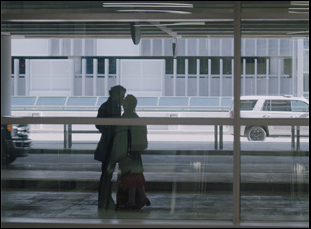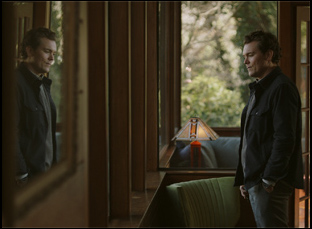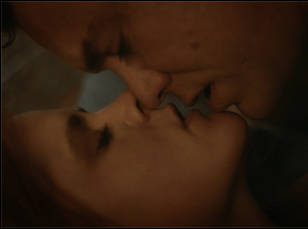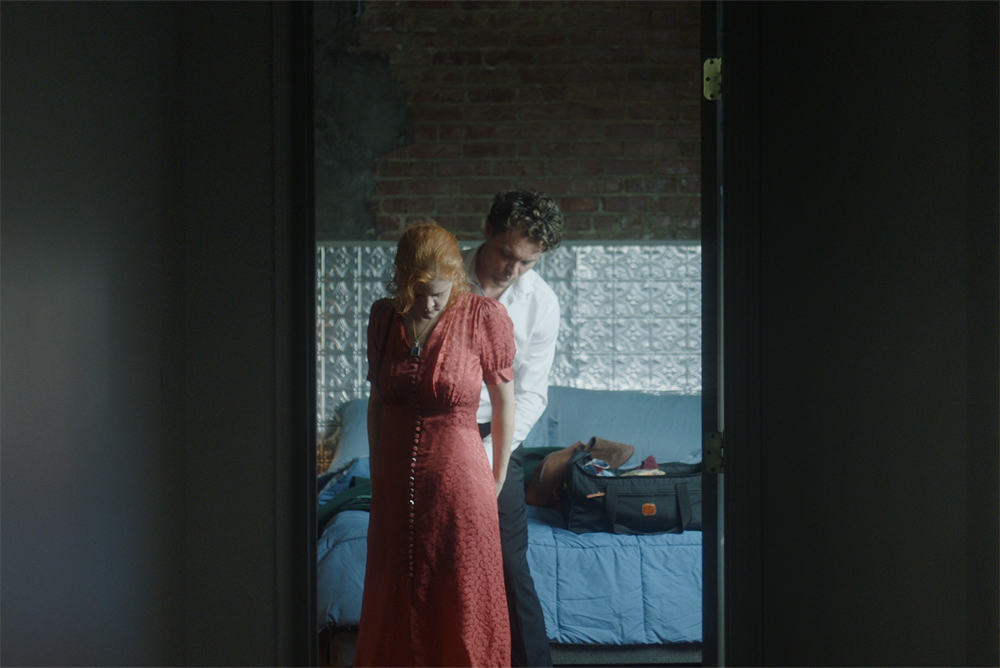Summer Shelton was taking a break from working on the closed captions for “You and I” when she took our call, the type of loose ends she had become accustomed to taking care of as a producer on such films as “Little Accidents” and “Keep the Change” only now as a director, it’s been entirely on her shoulders.
“I have this film memorized top to bottom,” she says. “I thought about maybe what I should do is like a one-woman show and just recite the whole thing — I do feel like there could be a great stage version of this play of this film.”
She likely isn’t wrong, but the film she made is a pretty mean version as is, and didn’t require too many more participants. The fact that Shelton wrote, directed, stars and edited “You and I” isn’t a sign of ego, but rather a culmination of skills she picked up from other productions to take risks with the romantic drama in which she stars as Sara, a music supervisor from Nashville who returns to her hometown for her sister Misty’s (Ashley Shelton) birthday. Inevitably, this means rubbing elbows with Joseph (Clayne Crawford), her brother-in-law Mark’s (Linds Edwards) best friend with whom she’s long had a spark and while a relationship was never consummated, the two seem to pick up where they left off for better or worse when they clearly have chemistry with one another yet you can’t always tell where flirtation is hiding genuine contempt for the other not making the first move.
As Joseph tells Sara, no one else ever danced the way they did and Shelton and Crawford tip-toe towards a reckoning as Sara’s weekend back home turns into a long one, having an opportunity to determine once and for all if they can make a go of it when both aren’t in other relationships. Regardless of whether the two characters can carry on, the actors playing the couple keep things lively as all of the passion that’s been pent-up between Joseph and Sara floods onto the screen and Shelton is able to reflect the delicacy of the situation as well as the strong emotions that are being held back in striking compositions where the darkness resides in the corners of well-appointed homes and the distance between the actors in any given scene speaks volumes about where they are in the moment emotionally. After a theatrical release earlier this fall, the film is now available on digital and VOD and Shelton graciously spoke about carrying the project on her shoulders with only a 10-person crew for the production and making something manageable as a feature directorial debut, as well as finding the right creative partner in Crawford, taking on a leading role as an actor and having a bet on herself pay off.

I know that I always had an interest in it, but I never thought of it as a reality and I never really had the confidence to just say out loud what I wanted to do. So much of my career is producing and what I can do for other people, and when you’re directing, a lot of people have to help you do things, so it was just a strange mindset to [think], “Why would anyone want to help me do this?”
Oddly, that seems to be a perfect way into telling a story like “You and I” about two people who are trying to figure out what they really want and what they need from one another to make that happen.
Yeah, exactly. It was a little bit of a Hail Mary for my career because I had been so blessed to get the Spirit Award in 2018 for producing, and I had some great projects and awards, but just couldn’t get anything off the ground. Then COVID hit, and I really didn’t know how I would recover in my career from it. It was hard to see the light at the end of the tunnel, so I thought if I’m going to go out, I’m going to go out on my own terms and reach for the stars and I’m just going take all the things I’ve learned over 15 years of producing and tell a story that I want to tell through my own voice.
What was it like to figure out a story that wouldn’t feel small, but had to be economical?
I definitely reverse-engineered making the movie and even writing the story a bit. I sat down and just made some ground rules, and it was a lot of things that I had been telling emerging writer/directors I’d worked with for a long time. First and foremost, write something close to your heart and that you feel emotionally connected to, but also I wanted something that was character-driven so that I could exhibit for my directing skills. I wanted minimal cast, minimal locations, and a story that takes place over a very brief period. The story only takes place over five days, so I’d have very minimal wardrobe changes, and I wanted to write it in a way where my co-star and I could film our storyline in order. I was able to do that because if you dissect the film, once we are in a location and once we finish it, we move on to the next one, so it’s not like any scene we return anywhere, it’s always moving forward, which is also a bit metaphorical for these people’s lives. Everything’s going to keep moving forward no matter what happens between them.

It is, and I’m not going to lie, I did have moments where I thought it would probably be smarter if I didn’t star in it, [where] the film might have a more chance at breaking through in the marketplace if I had cast someone maybe with a bit more notoriety. But I had a little bug for it in my early 20s when I started out and even in college, I did theater and a tiny bit of things in film before I found producing. Then even when I produced movies, I’d do these bit parts in these situations like, “Well, we can’t afford to fly anyone in for this role. We need somebody.” And I was a SAG member. So it was like, “Summer, can you do it?” That’s the way I got little bit parts in “At Any Price” and “Adult World” and little things, but this was different because this was obviously a leading role.
When I started [“You and I”], I wrote the first few scenes where my character is a little passive, a little more observant, not as forthright, which would give me some time to settle in to what it was. and I had shared [the script] with a few people who just told me, “Summer, this is so much of who you are and your voice and spirit and so tender. I think you should do it.” So I just thought, “You know what? I should just do it. Why the hell not? I’m already going to write, direct, produce, edit, and if I’m going to ask everyone around me to be so vulnerable, I really need to like do it myself as well and be able to create that safe space of emotional vulnerability.” So I hope I do a good job with that. I’d like to think that I can create that space on set.
Clayne is an interesting partner for this when he’s got real filmmaking chops as well. What it was like bringing him into this?
He’s got crazy filmmaking chops and I didn’t know him before we made this film, but I wrote it for him because during the pandemic, I binge watched “Rectify.” I saw him play this character Teddy Talbot and it reminded me so much of many of the Southern guys I grew up with. But at that time the show was a little bit older, so I thought, “Well, who is this guy? Where is he now?” And I Google’d him and watched this beautiful interview he did promoting his film at Sundance, ‘The Killing of Two Lovers,’ and he got very emotional talking about his family and his role as a father and I just saw these nuggets of “Oh, here’s who this person is and what’s important to them.” In that current moment, [I thought] “This is the person that I want to write this for,” and I like to go into writing having an idea or a voice or image in my head. He has such a bewitching face and also a bewitching voice and he’s very captivating on screen. So I had him in mind before I even started outlining the story and how crazy and silly is it that I would be so naive to think it would actually work out? But stranger things have happened.
When you shot it in chronological order, did anything change as far as seeing how the dynamics were playing out on set and going where it was naturally gravitating towards?
Yeah, when you get such a magnetic human being in a room with the material, your hope is that it’s only going to get better and stronger and I was very open to that. And I was just very blessed that we had the same goals and we were committed the same way. We were on the same page tonally, but things did change. If anything, it made me cut things out of the script because I felt like if we’d captured some beat or emotion in a certain scene, let’s just keep moving forward and there were a lot of things in the script that were maybe a little overscripted, little physical things that would have taken the audience member out of the coverage and I would have had to cover them in the edit — actually having to film certain things, and I just realized I didn’t need it.
It was just mainly about these two people, so the biggest things were deciding the big moments between these people, like, when is it that they finally touch? What is the space like when they’re together in a room? Having them move in a certain way around each other where they’re almost touching, but they’re not. Little things like that, just to elevate both. And I just wanted the audience to feel like these people felt very comfortable and natural with each other [where] it would just feel as if they’d been around each other their whole lives and you could imagine them being together for the rest of their lives because it just seems so natural.

Yeah, I definitely wasn’t precious about the script and the words on the page. But what’s surprising is [the final film] is not so different than what was written. I definitely made choices in the edit, because there is a specific point in the film where there is a time jump, but I didn’t write it that way. I wrote the story very linear chronologically], but when I got in the edit and was watching the footage, and I made the decision that I want the audience to experience the film the same way the characters experienced each other. There are certain things that these characters do that they’ll always remember as a memory and I wanted to somehow in the edit reflect those special moments between those people in a way that might evoke the idea of a memory.
What was it like figuring out how you would shoot this?
I was blessed with a wonderful angel of a cinematographer, Bruce Thierry Chung, who I had been connected with because of Jennifer Gerber, a dear collaborator of mine who also AD’d the film and she’s a director in her own right. They had worked together on projects that James Franco was a director on and also acted in, and I was very excited about the idea of working with someone that worked with a director that was in front of and behind the camera. But that was just one thing about Bruce. His work is very beautiful and very delicate and natural and observant and that’s what I wanted. And he and I did a lot of conversations about establishing ground rules, like the camera will never be as close to the people as they feel with each other. I always wanted the ending scenes of the film to be in close-ups, and in order for that to feel so impactful, it meant I wouldn’t shoot many close-ups leading up to that. But instead, I wanted to put something between the camera and the people, almost like a theatrical fourth wall, so you’re always shooting through a doorway or a mirror outside looking in until we get to those scenes where they’re really just two people together and there’s nothing between them anymore, except like they’re just there in the moment together.
Another collaboration that seemed really crucial was with Carly Johnson, who contributes a song as a centerpiece and I noticed that you co-wrote the end credits song together. What was it like working with her?
Carly is such a wonderful artist and her voice is just so beautiful. There’s only two music cues in the film and in the end credits song and [I thought] I’d love to honor some beautiful female voice and I found myself in the edit, reflecting on the experience of the film and on the character and I started writing some poetry. I wrote this one poem, “My Moon,” which was like Sarah’s love letter to Joseph’s character, and I thought, “Wouldn’t it be nice if maybe we could take that and turn it into some type of song?” I had discovered [Carly’s] work through Gil Holland, a producing colleague in Kentucky who shared some music references, and she’s based out of Louisville, and I wondered if she might collaborate with me. So I gave her my poems and to be honest, she sent me back a song. That was it. I was like, “This is great. How do we record it?” Now it’s just this beautiful way to end this movie.

I’m in what I call like a creative cocoon at times, and if anything, I feel a bit spoiled doing it because I like doing all these things. I like writing. I like directing. I love acting. I would love to act in more things — if somebody’s interested in me, send me an e-mail. I’ll put myself on tape. [laughs] And we as insiders know very much what all it means, but to the outside world, it’s a bit of a mystery of what all it takes to make a film. I’m finally getting to the point where I’m willing to be like, “Yeah, I worked really freaking hard and I learned a lot of things.” I’ve watched a lot of YouTube videos, learning how to use Adobe Premiere to edit the film and I also know that I don’t feel that I could have made this film had I not produced for 15 years. It would not exist because I wouldn’t have known how to approach it the way I did under these crazy circumstances of COVID. I shot this with 10 people in 14 days, and then I edited it myself. So it is it’s a lot, but I think it will make me a better producer and most importantly, it will make me a very much better director moving forward because going through editing a film, you really learn “I should have done this” or you see the things that you didn’t need to do.
I now feel confident in my vision and at the beginning, some people were maybe a little nervous for me because they’re like, “Summer, you should probably shoot some more coverage,” and I’m like, I don’t want it. I don’t need it. We have such little time. Let’s just move along.” I’ve been on so many sets. I understand why certain things work out and certain things don’t, and the one thing I have taken away from this film and hopefully this story is things happen for a reason. You might not understand them. Everything that brought this film together is kismet and all those things have prepared me for whatever is the next story I get to tell. But your first is always very special and I know that this film will always have a special place in my heart and the experience of making it with the kind people that came on board. They’ll always be in my heart.
“You and I” is now available to stream on Amazon, Apple TV+, Vimeo and Fandango.




